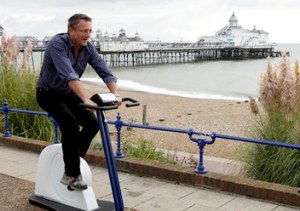 BBC Horizon recently discussed the recent burst of activity surrounding claims that just 3 minutes of very intense exercise (HIT high intensity training), done in 3×20 second sessions three times each week is enough to improve various health factors (such as insulin sensitivity and lung capacity).
BBC Horizon recently discussed the recent burst of activity surrounding claims that just 3 minutes of very intense exercise (HIT high intensity training), done in 3×20 second sessions three times each week is enough to improve various health factors (such as insulin sensitivity and lung capacity).
The program’s presenter Michael Mosely is a medical doctor and on the basis of an MRI scan from a previous TV show that showed up to be a bit fat around his inner organs and some mention of his father having type 2(?) diabetes he wanted to try this exercise regime to see if it would work for him.
Apparently, it can sometimes be an uphill battle to get media interest in physical activity research as it is often seen as being more of the same and that people already know they should be exercising more. Indeed, just last week the National Health Service started promoting a 150-minutes a week exercise campaign. So, it’s interesting that the BBC should time this show to highlight this particular piece of research and so grab people’s attention. But, where was the context? They did include some sedentary behaviour research, but there wasn’t a lot of context regarding what is known about the field of physical activity and sedentary behaviour. There is a danger that people will go away thinking that a few minutes a week is all they need to do for exercise, or that if you are a genetic ‘non-responder’ as it turned out Moseley is, then there is little point in exercising at all, which is, of course, wrong.
The worrying thing about the show though is that they did two experiments with Moseley in parallel. They had him do the intense bursts regime for a month at the same time he was concentrating on walking more and not sitting at his desk continuously for hours on end every day. They said that during the experiment time that he was burning an extra 500 calories (kcal) per day because of being less sedentary. Then they told us that his insulin sensitivity had improved by about 23% but his lung capacity didn’t change at all (the non-responder bit). But, now there is no way to know whether that 23% improvement was down to him walking and fidgeting more and burning those extra calories each day or the intense burst regime. It could have been that it was the increased calorie burning that had that effect as his respiratory fitness didn’t change at all, as he wasn’t doing any substantial extra cardiovascular exercise. Mosely says that the regime goes against the medical received wisdom. It does, but does it stack up?
There really ought to have been some more information on all the other benefits of exercise (when done for longer). They claimed that personal exercise is like personal medicine and that there cannot be a one-size-fits-all approach to exercise. As if not responding to a drug because of genetics is somehow analogous it’s not. Even if it’s harder for some people to benefit from exercise, you honestly don’t ever see obese, fast marathon runners. Even if you’re a non-responder genetically, exercise comes with many more benefits than increasing VO2 max in some people. Cardio-respiratory fitness is just one aspect of health, physical activity is still really important for a host of other health benefits such as metabolic risk, weight management, maintenance of lean tissue, bone health etc, let alone the beneficial affects on mental well-being that come from exercise. Mood enhancement, normalization of circadian rhythms and stress reduction are just a few of the many mental health benefits exercise can have. Evidence is mounting for the benefits of exercise on mental health but psychologists are only now beginning to add it to their treatment regimes for their patients.
There was some suggestion that even if you got to the gym every day but sit at a desk for 12 hours you are somehow doing yourself harm. I suspect that much of that research has been hyped by the makers of standing workstations and treadmill desk attachments, to be frank. It would very disheartening to learn that my daily hour walking the dog and 2-3 trips to the gym each week are cancelled out by the fact that I work sat down at a desk much of the working day.
Thankfully, a paper just published in JAMA looked at the physical activity levels in 20,000 children and adolescents and suggests that being active may be more important than how much time you spend being sedentary. I hope they have a cohort to show that the same applies in adulthood.
The third aspect of the Horizon episode demonstrated that the brain has a cut-out switch that stops you exercising if your muscles tell you it might cause damage, i.e. pedal on a bicycle really hard for too long and it gets painful and your brain won’t let you continue. However, this isn’t a physical limitation and the threshold is set rather low for most people. Without causing actual damage it seems that you can workout through that barrier and get fitter still.
I will be following up this post with some thoughts from Soren Brage, an Investigator Scientist in Physical Activity at the MRC Epidemiology Unit in Cambridge. Watch this space.